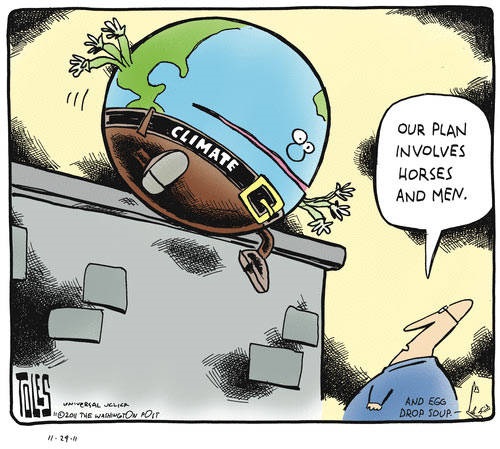
In Carbon Dioxide's invisibility is what causes global warming, John Cook sets the record straight about an absurd comment about climate change made by Tony Abbott, Leader of the Opposition in the Australian House of Representatives and federal leader of the centre-right Liberal Party of Australia. Cook's article garnered the most comments of the articles posted during the past week.

This is a world that we have to avoid at all costs. Many scientists suggest that a 4°C rise is incompatible with an organised global community. It is beyond “adaptation.” Yet this review of 4°C temperature rise does not take into account possible feedbacks and other discontinuities, which on average are anticipated to make the situation worse still.
So a 4 degrees future is something we must avoid. And that takes us back to 2 degrees – albeit with increasingly lower probabilities of achieving even this. What does 2°C imply for the wealthy parts of the world, the OECD countries? It means a 10% reduction in emissions every single year: a 40% reduction in the next few years and a 70% reduction within the decade. Such reductions are necessary if poor parts of the world are to have a small emission space to help their welfare and wellbeing improve.
Despite the coherence of this analysis, I am repeatedly advised that such levels of mitigation are impossible. At the same time, living as a civilised global community with a 4 degrees rise would also seem impossible. In other words: the future is impossible!
So what do we do? We have to develop a different mind-set – and quickly. The impossibility we face on mitigation may open us to conceiving of different futures – moving beyond the reductionist thinking of the twentieth century, and towards new ways of framing issues in the twenty-first century.
- Kevin Anderson of the Tyndall Centre for Climate Change Research
"A World That We Have to Avoid At All Costs" by Gabriel Levy, DeSmog Canada, July 17, 2013
They didn't change the name from 'global warming' to 'climate change' by gpwayne is a new 'basic' level rebuttal of the contrarion argument, "They changed the name from 'global warming' to 'climate change'."
On last week's BBC show Sunday Politics, UK Energy and Climate Change Secretary Ed Davey discussed climate with Andrew Neil. The Consensus Project was discussed first, with Ed Davey correctly describing the 97% consensus result, and Neil subsequently misrepresenting the paper. Dana followed the show with a debunking of Andrew Neil's climate errors at The Guardian. Neil has promised a response this week, which will iikely warrant another follow-up from Dana.
Lisa Hymas also referenced the TCP 97% consensus at Grist in discussing the Republican congressional staffer who had to remain anonymous in order to come out in support of a carbon tax. So did Roz Pidcock at Carbon Brief in debunking Andrew Neil, and Mike Brennan at Does it hurt to think? in giving a primer on scientific consensus.
Mark Robison at the Reno Gazette Journal debunked myths about the global warming consensus and quoted Dana in debunking myths denying continued global warming.
The Climate Reality Project received a Gold placement for "Reality Drop" (coordinated with SkS) at the Golden Award of Montreaux.
Climate Progress re-posted Rob Painting's Looming Climate Shift: Will Ocean Heat Come Back to Haunt us?.
The Raw Story re-posted John Cook's Carbon Dioxide's invisibility is what causes global warming.
Greg Laden referenced various SkS resources in discussing an FTBConscience Conference Session about Thinking Rationally about Climate Change.
What's Up With That Watts? now understands why climate science 'skeptics' hate SkS.
The Frog that Jumped Out referenced Dana's The Economist Screws Up on the Draft IPCC AR5 Report and Climate Sensitivity and the SkS myth rebuttals database.
Collide-a-Scape referenced AndyS' distinction between stoppable and irreversible global warming.
The Tyndall Centre for Climate Change Research is an organisation based in the United Kingdom that brings together scientists, economists, engineers and social scientists to "research, assess and communicate from a distinct trans-disciplinary perspective, the options to mitigate, and the necessities to adapt to current climate change and continuing global warming, and to integrate these into the global, UK and local contexts of sustainable development."
The centre, named after the 19th century UK scientist John Tyndall and founded in 2000, has eight core partners: the University of East Anglia, University of Cambridge, Cardiff University, University of Manchester, Newcastle University, University of Oxford, University of Southampton, and the University of Sussex. Fudan University (Shanghai, China) joined the Tyndall Centre partnership in May 2011.
From 2000 until 2010, core funding was provided by the UK's Natural Environment Research Council, the Economic and Social Research Council, and Engineering and Physical Sciences Research Council. The Tyndall Centre in the UK is now primarily funded by the host universities and by research grants. Fudan Tyndall Centre is funded with a 15 year commitment by the Chinese central government and the Shanghai City government.
Posted by John Hartz on Sunday, 21 July, 2013
 |
The Skeptical Science website by Skeptical Science is licensed under a Creative Commons Attribution 3.0 Unported License. |